Launch of Healthtalk Australia Early Menopause digital resource for women and health professionals
Over the last three years, aligned with our strategic mission of fostering partnerships, AMS has been a partner in a NHMRC Partnership grant together with universities, hospitals, other medical societies, non-government organisations and support groups. This project involved the co-design and development of a comprehensive digital resource for women with early menopause (EM) and health professionals (HPs) featuring their experiences, and perspectives (audio and video clips), a question prompt list with weblinks to information, evidence based diagnosis and management algorithms and resource lists. The resource is designed to support, inform and help with diagnosis, management and improved communication between women and their HPs for better health outcomes. The research team and participating HPs involved a number of AMS members and there is a link from the AMS website to the Early menopause resource. The Early Menopause digital resource was launched at Women’s Health Victoria by The Hon. Gabrielle Williams, Victorian Minister for Prevention of Family Violence, Minister for Women and Minister for Youth on November 4, 2019 with participants, members of the research team, partner representatives and invited guests attending. The research team would like to thank all participants, reference group members and partners involved.
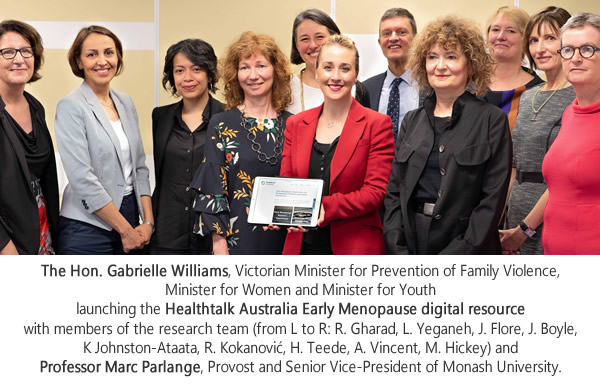
To access the Early menopause digital resource:
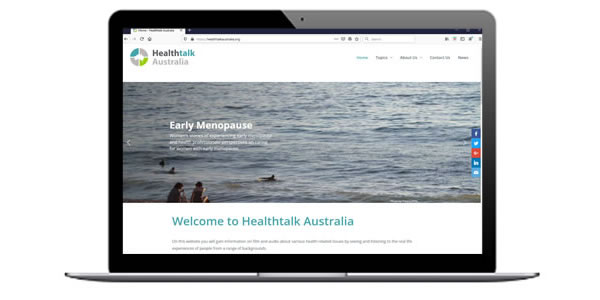
The Research team included:
Chief investigators
- Professor Helena Teede, Executive Director, Monash Partners Academic Health Research Translation Centre; Director, MCHRI, Monash University and Endocrinologist, Monash Health
- Professor Renata Kokanović, Professor of Medical Sociology and Vice Chancellor’s Senior Research Fellow, Social and Global Studies Centre, RMIT University
- Adj. Clinical Associate Professor Amanda Vincent, Head, Early Menopause Studies, MCHRI, Monash University and Endocrinologist, Menopause Clinic, Monash Health
- Associate Professor Jacqueline Boyle, Deputy Director, MCHRI, Monash University and Gynaecologist, Menopause Clinic, Monash Health
- Professor Martha Hickey, Professor of Obstetrics and Gynaecology, University of Melbourne and Head of Menopause and Menopause after Cancer Unit, The Women’s Hospital
- Professor Roger Hart, Professor of Reproductive Medicine, University of Western Australia
Research Team
- Dr Kate Johnston-Ataata, Research Fellow, Social Research in Health Program, Social & Global Studies Centre, RMIT University
- Dr Jacinthe Flore, Research Associate, Social Research in Health Program, Social & Global Studies Centre, RMIT University
- Dr Kim Huynh, Research Program Manager, MCHRI, Monash University
- Ms Ladan Yeganeh, PhD Candidate, MCHRI, Monash University
Aims of the project:
- Explore experiences of women and health professionals
- Assess current guidelines and develop care plans
- Co-develop online information / tools for communication between women and HPs
- From 1-3, to develop and evaluate an EM digital resource
- Widely share findings with partners and stakeholders
Results of the project:
Experiences and perspectives:
Video and/or audio interviews were conducted with 30 women with diverse causes of EM and 16 HPs of different specialties involved in their care. Findings from the interviews summarising their perspectives and experiences are shown below in the table:
|
30 women with EM |
16 Health Professionals |
|
|
Co-designed tools:
- Question prompt List
Women with EM were surveyed and reported they had difficulty communicating with their HPs, especially about topics related to sexual function, vaginal or urinary symptoms, and psychological effects. A question prompt list (QPL) is designed to help women and HPs communicate. Women said they were very likely to use an EM QPL, and that symptoms, physical/ psychological effects, long-term implications and management were all important to include as QPL topics. A draft QPL was developed (including links to credible information designed to enable women to obtain information themselves) and refined with feedback from women with EM. In interviews and pilot testing, the co-designed QPL was perceived by women as informative, user-friendly and empowering. HPs reported the QPL would help patients ask questions about important and sensitive issues.
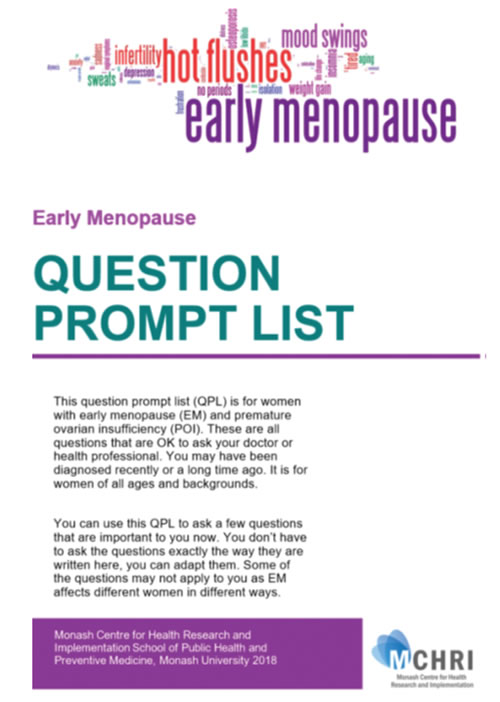
- Diagnosis and management algorithms
A systematic search of menopause guidelines was conducted and 22 guidelines were included for formal evaluation using the AGREE II methodology. Recommendations from high ranking guidelines regarding diagnosis and management of early menopause/ premature ovarian insufficiency were summarised and used to construct algorithms. These were then refined using feedback from clinicians (general practitioners, endocrinologists and gynaecologists).
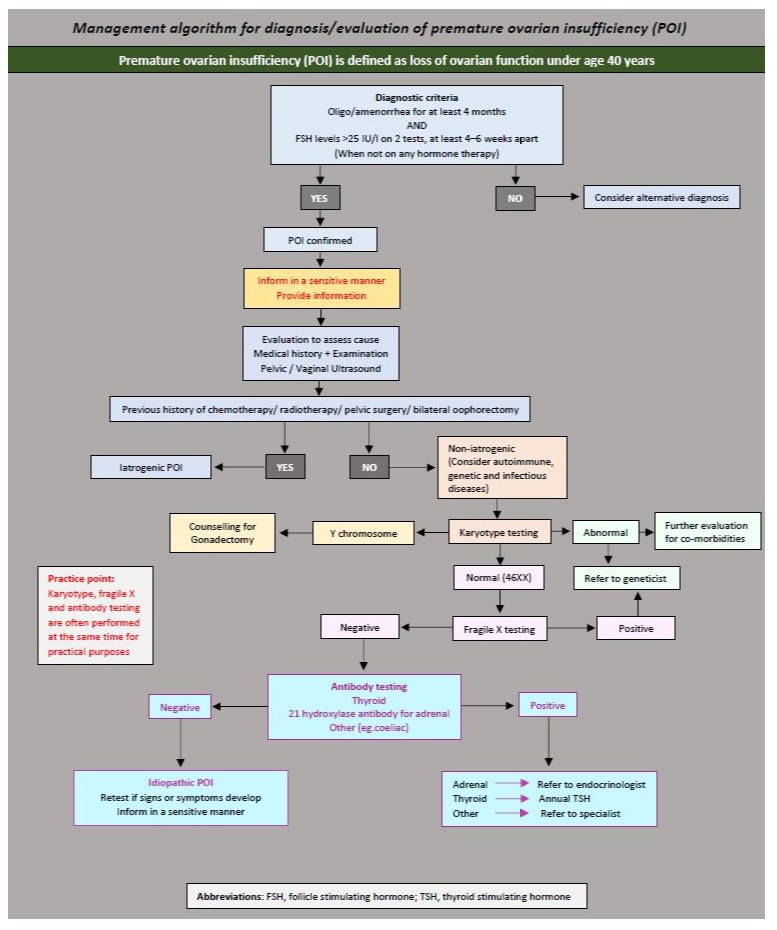
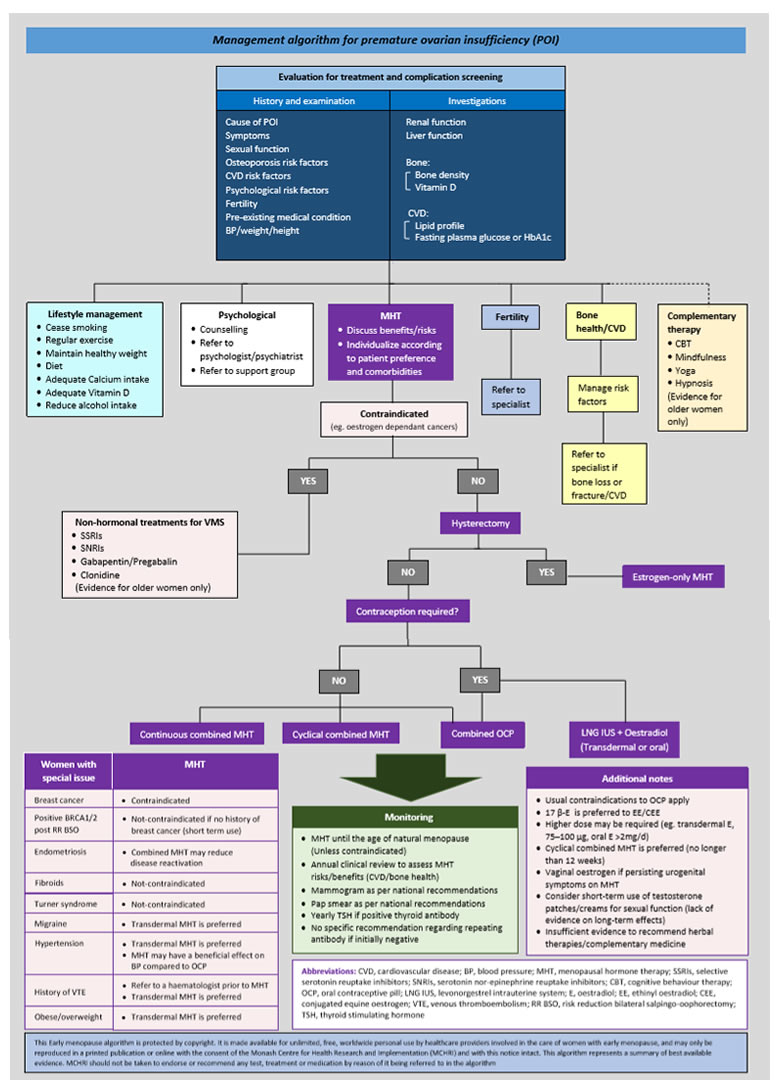
Evaluation
The digital resource was evaluated by 105 women with EM with an overall satisfaction rating of 8/10. Positive ratings for usability was observed with over 80% considering the resource easy to read and understand. Analysis is ongoing. Individual responses included:
Dissemination
Findings from this project have been disseminated via presentations at international and national conferences to multiple stakeholders, publication in relevant journals including ‘Maturitas’, ‘Climacteric’, ‘Menopause’ and ‘Medicine Today’ with more activities planned including an active learning module.

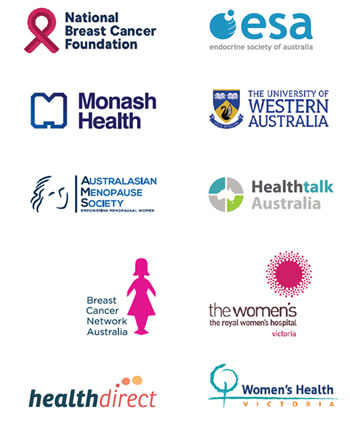
Content created 21 November 2019
